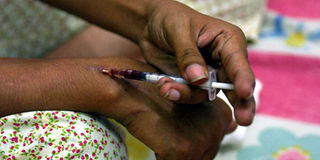Address drug and substance abuse by youth

A heroine abuser. FILE PHOTO | CHOO YOUN-KONG | AFP
What you need to know:
- A good starting point would be finding out why young people are getting hooked to codeine and other forms of drugs and substances.
- Governments also need to think about those who are addicted and revamp rehabilitation and reintegration avenues.
BBC Africa recently aired Sweet Sweet Codeine, an investigative piece by Ruona Meyer on the abuse of codeine in Nigeria.
Ruona got interested in the subject after watching her brother struggle with codeine syrup addiction.
Through the feature, she goes undercover to show how senior sales executives from big pharmaceuticals in Nigeria strike deals with people looking to sell codeine to the youth, the effects of the drug and the state of the existing rehabilitation and mental health facilities where some of the addicts end up.
An estimated three million bottles of codeine are consumed daily in one of the states in Nigeria.
Following the feature, the government of Nigeria banned the syrup. In Kenya, about 90 people die from opioid overdose (including codeine).
ADDICTION
Through the Pharmacy and Poisons Board, the Kenyan government has banned purchase of codeine without a prescription.
Manufacturers have been asked to put warning labels on packaging and include patient information leaflets highlighting the risk of addiction to medicines that have codeine.
Although these measures are good attempts at reducing access to codeine, they are not enough to prevent the deaths and wastage of young people across the continent.
Besides attempting to cut-off the supply of the syrup, there is a need to cut-off those who supply it — especially in the black market — through heavy penalties to those found supplying.
More importantly, governments should cut-off the need for the supply.
They should not rely on ‘cold-turkeying’ everyone on codeine but devise complimentary ways of dealing with the problem.
A good starting point would be finding out why young people are getting hooked to codeine and other forms of drugs and substances.
REHABILITATION
Reports from Nigeria say the price of codeine in the black market has shot up since the ban.
That means the supply is still there and, if the ‘why’ is not addressed, the society will either have to deal with an alternative drug or an spike in robberies and kidnappings as addicts look for ways to get money so as to afford the now more expensive codeine.
Governments also need to think about those who are addicted and revamp rehabilitation and reintegration avenues.
In Kenya, the use of medically assisted therapy in the main mental health referral and training hospitals — such as Mathari National Teaching Hospital in Nairobi, and in Malindi — has gone a long way in assisting those who were previously dependent on heroine.
The programme offers methadone and counselling through outpatient services.
AWARENESS
Such services, as well as forming partnerships with the media to do a sequel that gives information to the society, will go a long way in providing care for the affected.
Establishing champion programmes, where those who have recovered are part of the awareness campaigns and participate in exploring ‘the why’ and ‘the what next’, will also help in reducing the chances of more young people getting into drug and substance abuse or looking for alternatives.
Issues such as unemployment, lack of skills and capital to create own jobs and difficulty in accessing markets for services and products by young people need to be addressed.
HEALTHCARE
The ministries of labour, trade and education ought to be present during such deliberations to explore how to make countries more youth-friendly.
Youth-friendly healthcare and, more importantly, mental health services need to be prioritised alongside continuous awareness programmes that make youth comfortable enough to seek help and not look for alternative solutions to issues.
Ms Wafula is a TED Speaker and an Aspen New Voices fellow who runs an incubation programme on mental health in Africa[email protected]





